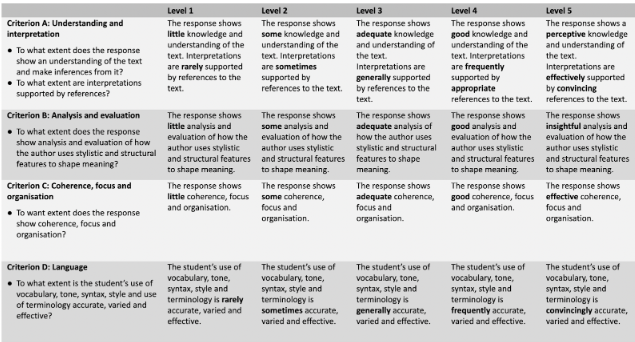Ultimate Guide To IB English – Language A: Literature HL Exam
What’s Covered:
- IB HL vs SL: What’s the Difference?
- How Do HL Papers/Exams Work?
- How are the IB English SL Papers/Exams Scored?
- How Does the IB English HL Exam Affect My College Chances?
IBDP, which stands for The International Baccalaureate Diploma Programme, is a common high school diploma alternative to the AP system, a system very popular here in the U.S. The IB system is much more internationally accepted, and considered a lot more rigorous in academics and exams.
The exams can be a hard spot for IB for many students, and one of its flagship subjects, English Literature, is considered difficult and its exam is no different. Hopefully this guide can break down the exam into some digestible information and make it easier for you to approach the examination.
IB HL vs SL: What’s the Difference?
All IB classes/courses have two versions, higher level (HL) and standard level (SL). The most prevalent difference between these two versions is mostly the amount of coursework expected, as well as some key differences to what’s being provided to the student as learning material.
Language A is separated by not only the difficulty of exams but, there are different kinds and options for reading material for the class. Reading material matters here because the exams are based on reading material.
How Do HL Papers/Exams Work?
HL papers for the Literature exam are divided into two components:
- Paper 1 is a 2 hour and 15 minute long essay-based examination that requires you to analyze unseen texts.
- Paper 2 is a 2 hour and 15 minute long examination that will require you to answer questions based on the required texts for the course, and questions can be picked based on which texts you chose to read.
Paper 1
This paper is a bit more difficult for most students because the questions are based on unseen excerpts as opposed to the reading materials you’ve read during the two year curriculum. These unseen texts are hard to prepare for, but based on the type of student you are, you might find this more approachable as they’re concise and require more reading between the lines. For these texts it’s important to get to the motive and theme of the text as soon as possible, as opposed to understanding the actual context. Skim reading and breaking down sections into groups based on common themes is a common hack for this paper.
Ideally you’d want to have a general plan before you step into paper 1. The plan should detail your approach to reading the exam and its texts. Breaking the texts down to the following subcategories would be useful for literature analysis:
- Theme
- Contextual and Content
- Author Motives
- Settings
By breaking the text down like this, you can identify the purpose of the excerpt and hence answer any question that involves the analysis of the literature pretty easily, because your plan has already been executed as you were skimming or reading.
This plan should make paper 1 much more manageable, but some practice goes a long way. Make sure to use previous examinations and specimen papers to your advantage and practice older questions to perfect your skills.
Paper 2
Paper 2 can be considered a little easier given that you’re aware of the texts that will be used for the examination, and you can choose which questions you wish to solve out of the provided options. These options make it even easier to implement the plan as described previously! Paper 2 is only as difficult as you come underprepared so study those texts and provide literature!
The texts refer to readings that have been assigned from a board at IBO, and these selections are sent to schools all over the world. The way the paper is designed, no matter which option you choose to read for a text, there will be an exam question that pertains to your selection. There will also be numerous generalized questions that can refer to many texts and be pretty-opened.
There’s ample time to create answers that are more concrete and proofed compared to responses in paper 1, therefore the grading expectations for this paper are less lenient than paper 1. Understanding your provided reading material is key to excelling in this paper, so making sure to come in prepared is the key difference of passing and failing this paper.
How are the IB English SL Papers/Exams Scored?
Both papers are scored out of 20 points, and are based off a rubric/criterion chart that can be used to pick a score based on performance.
The criteria can be clearly seen in the diagram above, with level 1 being the weakest performance in each criteria, up to 5 being the strongest.
You should study the criteria thoroughly because it shows you what the grader is looking for in a good, well-written essay/response.
The scores out of 20 are then used along with your performance in internal assessments to determine a grade out of 7 for the class. The table below, called a grade boundary table, is used by graders to determine this score out of 7.
To calculate your grade, you would take the total score on both papers (which is out of 40) and your internal assessment grades, a total isn’t as clear here as it’s based on what your teachers would decide. Divide your earned points by the number of available points to score, and multiply the decimal by a 100.
Final Tips
Read Early
Given that paper 2 is completely dependent on how well you’re prepared by understanding your literature options, read earlier and get a head start. The sooner you understand your text, the earlier you can analyze prior to the exam. By getting this over with, when the exam rolls around you’re already done with the prep work required to solve the prompts and questions.
By reading earlier you may also notice the text you chose isn’t quite suited for you, or you simply don’t enjoy reading it. The extra time from starting it earlier, gives you a chance to swap our selections if required.
Exam Stress Management
A more general, but equally as important tip! Managing stress during exam season can be difficult, but a couple healthy practices can make it easy! Start by telling yourself exams are not as important as schools make them out to be! They are not going to decide our future, and certainly have less impact on your chances of college admission than you’d think! Understanding this can remove a lot of stress off you, which funnily enough might make you even perform better due to feeling less inclined to exceed those expectations that were previously placed on you!
How Does the IB English HL Exam Affect My College Chances?
In short they do not! Scores don’t mean much when it comes to college admissions, but showing the will to be in a hard class like English Literature HL is more important. Colleges are inclined to favor students with a set of more difficult classes as opposed to high scores and other metrics.
A nifty tool, CollegeVine’s admissions calculator, takes all factors that do matter in college admissions, ranging from extracurriculars, GPA, and standardized test scores, along with a lot more, and provides you with your unique chances of getting into a college/university of your choosing.





